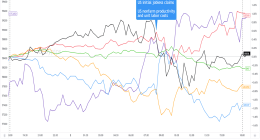

As physical distancing and lockdowns make us more dependent on technology than ever, some are proclaiming that the coronavirus pandemic has killed the techlash. WIRED’s Steven Levy recently argued that “the deus ex machina of an overwhelming public health crisis has changed things [for tech].” The Verge’s Casey Newton noted that if the techlash isn’t dead, it’s at least on hold as “Americans are relying on technology companies to get them through the next several months.” Recent polls on consumer sentiment towards tech are mixed but I’m not convinced the techlash is over; I’m more convinced now that it hasn’t really started.
Maybe the pandemic is revealing that the techlash was misdirected all along. Maybe what we’re really upset about is how tech has continued to evade laws. Or more accurately, how laws have been architected to help tech evade accountability. As Shoshana Zuboff eloquently points out in her now widely cited treatise on the subject, “[Surveillance capitalism] is not an inherent result of digital technology, nor is it a necessary expression of information capitalism.” Rather, it’s the result of unfair legal architecture that expensive corporate lawyers have designed to allow big tech companies to work against the public interest.
WIRED OPINION
ABOUT
Elizabeth M. Renieris (@hackylawyER) is a privacy expert, a fellow at the Berkman Klein Center for Internet & Society at Harvard University, and the founder of Hackylawyer.
Coined by The Economist in 2013, the “techlash” has steadily gained popularity, manifesting in everything from employee strikes and activism at Google, Microsoft, and elsewhere, to a flurry of legislative proposals to reign in big tech through competition policy and novel approaches to taxation, a growing reluctance of new talent to join the big tech workforce, and arguably an entire decentralization movement aimed at releasing the chokehold of large, centralized intermediaries (ironically, often driven by tech giants like Microsoft and IBM).
Tech is often blamed for everything from the erosion of individual privacy via surveillance capitalism to the destruction of democracy itself through election interference, and the increasing polarization of society as a whole. Even in the midst of this crisis, the backlash rages on against some tech companies, including Amazon, gig economy giants like GrubHub and Uber, and, perhaps most notably, the videoconferencing services company Zoom.
After public outcry over its privacy and security practices, as well as new forms of online harassment known as “Zoombombing,” Zoom is under investigation by regulators. After firing a whistleblower who raised concerns about workplace health and safety inside the company’s warehouses, Amazon once again came under public fire. And companies like Instacart and Uber are taking heat for classifying workers as contractors rather than employees, depriving them of health care, paid sick leave, and other critical protections during this challenging time.
Despite this outrage, Zoom’s usage and share price have skyrocketed as everything from workplaces to educational institutions, virtual happy hours, and workout classes, and even sensitive gatherings like Alcoholics Anonymous meetings, have migrated online. Similarly, Amazon struggles to fulfill its own customer demands, as governments ask for its help delivering vital supplies and testing kits via its private supply chains. Instacart is hiring hundreds of thousands of shoppers to keep up with its spiking demand.
The techlash did not result in a mass consumer exodus from the technology products and services offered by giants like Google, Apple, Facebook, Amazon, and Microsoft before the pandemic; it is even less likely to do so in the midst of it. Instead, the crisis cements the tyranny of incumbents and catapults newcomers into overnight dominance. This is especially true as governments around the world turn to these same actors to help with contact tracing, enforcement of social distancing rules, and other pandemic-related response measures; the Apple-Google contact tracing API is a prime example of this.
But our continued use of, and now increasing reliance on, these tools, does not erase a history of abuses or mean that we necessarily feel any better about this “tech” now. When iPhones and Androids dominate the market for mobile devices, it’s hard to opt out of features at the operating system level. When we don’t like a company’s practices, it’s not always easy to boycott their services; often there is no meaningful alternative. What good is a social network or videoconferencing platform that none of your friends or colleagues use? Network effects are real, and they are more pronounced in the captivity of a pandemic. So if our outrage isn’t gone, what’s really going on here?








